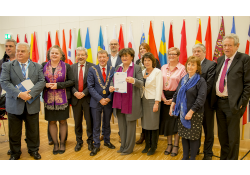Policy

WHO/Daniel Urrutia
WHO Member States in the WHO European Region have made various commitments on a range of issues including strengthening health systems, addressing the obesity epidemic, controlling the noncommunicable diseases epidemic and preparing to deal with the effects of climate change.
Healthy cities are all about local involvement. They continually and actively explore ways to contribute to implementing WHO strategies at the urban and local levels. They have the potential to provide essential public health leadership, to create the preconditions for healthier living and participatory governance and to facilitate intersectoral action. Further, in times of economic downturn, city governments can play a key role as advocates and guardians of the health needs of the people who are most vulnerable and socially disadvantaged.
The content, organizational features and ways of working of each five-year phase of the WHO European Healthy Cities Network have been shaped by new WHO strategies, priority health issues of relevance and concern at the urban and local levels, lessons learned from and achievements in previous phases, new scientific evidence on the determinants of health and the effectiveness of public health interventions and changes in the European social and political environment.



